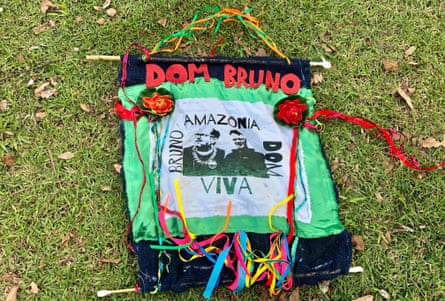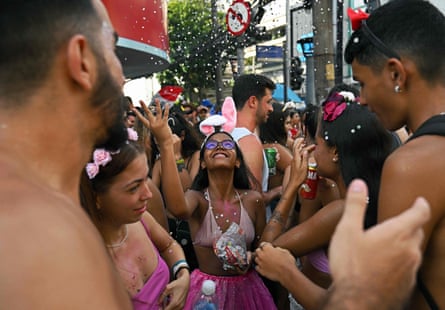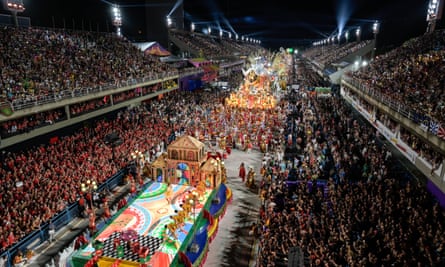Perched atop 35-inch stilts and wearing an antler headpiece, Liana Barros held up her carnival costume’s pièce de résistance: a banner bearing tribute to the British journalist Dom Phillips and the Brazilian Indigenous expert Bruno Pereira, who were murdered in the Amazon last year.
The banner fluttered among other standards honouring figures such as the assassinated Amazon defender Chico Mendes, as Barros, a 50-year-old civil servant, paraded with the Terreirada, a visually striking bloco (a musical troupe that leads street parties) celebrating Brazilian folklore.
Amid all the dancing and debauchery, Rio’s carnival has indeed always been an occasion for political protest and cultural commemoration too.
“Terreirada is a bloco that seeks to revive Brazilian traditions and symbols … and it also highlights people who took a stand on various struggles over the years, struggles that are important to Brazil and humanity. I believe it is more than right that Dom and Bruno are among these personalities being honoured,” says Barros.

She was not the only one to think so. Phillips and Pereira, whose deaths last June became emblematic of the previous Jair Bolsonaro government’s disdain for the environment and Indigenous rights, were remembered at Rio’s Sambadrome on Saturday night, in the Amazon-themed procession of the Porto da Pedra samba school.
While rage and resistance fuelled carnival’s political statements during the far-right Bolsonaro government, the atmosphere this year is lighter. Most Brazilians are celebrating the unbridled return of the festivities after a pandemic-imposed hiatus and the start of a more optimistic political era following Luiz Inácio Lula da Silva’s narrow victory over Bolsonaro last October.
“The Bolsonaro government was one of the darkest moments in our recent history … Everything was pretty gloomy, the election was really tight, the pandemic left everyone really dejected,” says Djalma Junior, 58, a co-writer of samba songs for Barbas (Beards), a traditional left-leaning bloco that was born out of opposition to Brazil’s 1964-1985 dictatorship.
“Lula’s return gives us hope, we sing this, ‘gardens are in bloom’,” said the samba composer, quoting from one of this year’s songs that got revellers dancing to impertinent lyrics ridiculing Bolsonaro supporters’ refusal to recognise electoral defeat and hailing the triumph of democracy.

“Both on the streets and in the samba school processions, I’ve noticed a sort of carnival of victory. As if carnival was this big celebration of the Brazil that we want,” said Bernardo Pilotto, 39, a sociologist and keen carnival-goer who runs an Instagram account curating carnival-related information.
Rather than being critical, this year’s political costumes mock the ghost of communism or demand a ministry of romantic relationships, a jokey reaction to a throwaway comment by Lula who last year promised everyone would find love during his presidency. But with the wounds of Bolsonaro’s dismal legacy still raw, the gleeful celebrations which run until Ash Wednesday are also peppered with moments of remembrance, such as the tributes to Phillips and Pereira.
“It’s a celebration without forgetting the past,” Pilotto adds.
An irreverent bloco of beer-worshippers called Ibrejinha struck that balance, filling the streets early on Monday morning under the theme “democracy reborn”. Their church-shaped beer cart featured pictures of Brazilians dead and alive representing the environment, human rights, culture and science – areas which the previous government had at best neglected and at worst attacked.
“We understood the importance of speaking out about certain issues that were forgotten during [the Bolsonaro] years,” said Pedro Treiguer, one of the bloco’s organisers and trumpeters.

Treiguer and his troupe started prancing through the streets wearing red cassocks – a colour associated with Lula and his Workers’ party. Amid a rousing rendition of Juízo Final, an anthem of hope and renewal by the late great samba composer Nelson Cavaquinho, the performers suddenly stripped off, revealing skimpy, glittery outfits in blue, green and yellow – the colours of the Brazilian flag which had become hijacked by the far-right in recent years.
“We’re reclaiming our colours, but it’s also about recovering our pride in being Brazilian, reclaiming our symbols and reclaiming democracy,” said the 30-year-old journalist. “Good things are coming, but it’s extremely important that we don’t forget, that we keep remembering and keep fighting.”

 1 year ago
75
1 year ago
75










 English (US)
English (US)